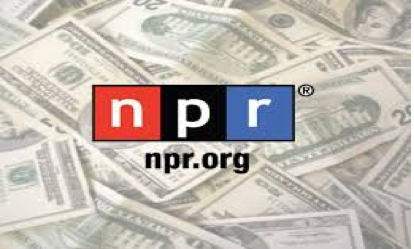CommentsCOMMUNICATION POLITICS-Anyone listening to National Public Radio (NPR) and the Public Broadcasting Service (PBS) can hear no more insightful, well-produced, or entertaining news programming anywhere...except when it comes to reporting anything that might contradict the perceived financial or political interests of one of NPR's large corporate/foundation donors.
As one local KPCC reporter said to me when I asked why neither her station nor NPR ever reported such basic information as how much money corporations would make if they were successful in privatizing public education or decimating the ranks of high seniority teachers, her response was, "We're not going to bite the [corporate] hand that's feeding us."
And make no mistake, with the most recent proposed cuts in federal funding and the huge increased dependence on large corporate and foundation subsidies from pro-public school privatization interests controlled by the likes of Broad, Gates, Walton, any notion of "commercial free radio" has become even more of a fantasy. Just consider that in 2009 already 26% of NPR's total budget came from corporate sponsorship. And this has only increased in recent years to now hover around 50%.
Try a little experiment. When you've got an hour to kill, take a stop watch and time what percentage of any hour on "non-commercial public radio" is, in fact, commercial. While you might make a distinction and argue that the incessant solicitations for your old vehicles or those fund drives they conduct several times a year are not commercials, just a means of funding NPR and PBS without resorting to more obnoxious "I am the king" or "You're killing me Larry" type commercials, NPR and PBS's equally obnoxious "non-commercial" ads for geriatric goods and services directed at its senior citizen listenership comes in a close second at possibly crossing the line. And maybe, as corporate sponsorships rise with the hawking of all sorts of other goods and services (either directly or through stories chosen for coverage by NPR,) hasn’t the fine line between commercial and non-commercial media already been crossed?
To avoid being labeled negative by posing an albeit valid complaint without a solution, let me suggest taking a page from the mega-rich Getty Trust that funds a museum, publishing company, and other benevolent socially responsible endeavors for free.
Similar to what people are trying to do to overturn the Citizens United case to create a truly publicly funded electoral system, I would like to see NPR, PBS, and other non-profits allegedly loyal to society do what the Getty Trust has already done. I would not ask a corporation to provide the funding. Rather, I would seek to endow NPR with a large enough principal sum of money in the same way the Getty Family Trust initially did, so that the returns from socially conscious and environmentally neutral investments would cover public broadcasting's annual expenses just as the Getty Trust's initial endowment of the museum and other endeavors have been able to cover all of its present and future annual expenses.
Think about it. What would you be willing to come up with on a one-time basis if you knew that you would get real news, never have to listen to another fund drive or someone incessantly asking for that old car, truck, motorcycle or bus in your driveway?
(Leonard Isenberg is a Los Angeles observer and a contributor to CityWatch. He was a second generation teacher at LAUSD and blogs at perdaily.com. Leonard can be reached at [email protected]) Edited for CityWatch by Linda Abrams.
-cw
Tags:















